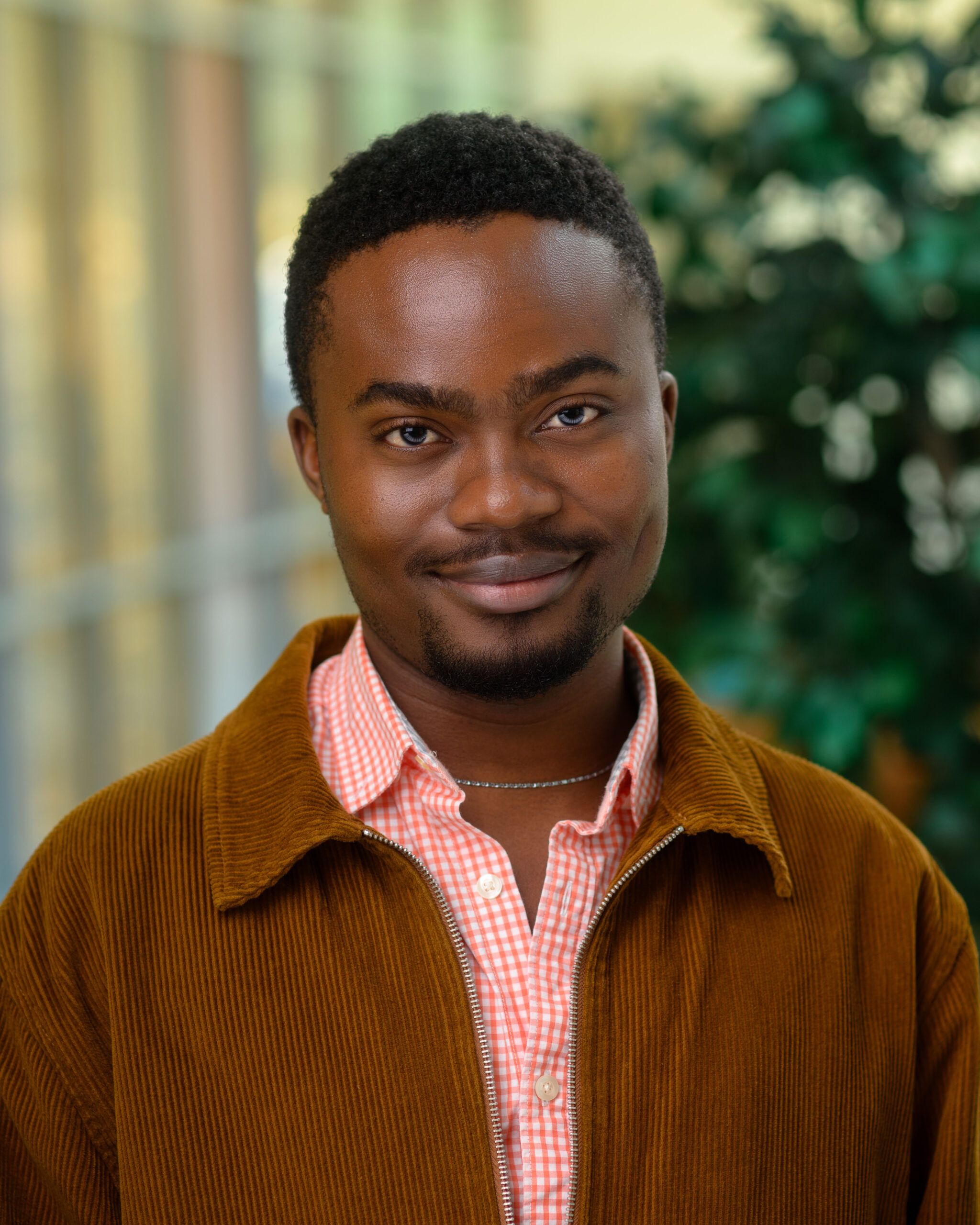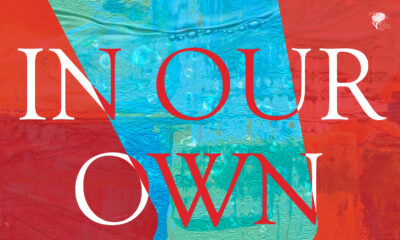Features
“I’m Excited to See How the Story Presents Itself in the World”: Olakunle Ologunro on Language and Writing Abroad

Olakunle Ologunro and I graduated from the same university, the University of Ilorin (Unilorin). We both studied English. In my first year, Olakunle was one of the writing references for creative writers on campus. He was a 2016 alumnus of Chimamanda Ngozi Adichie’s writing workshop, and his story, A Nonrequired Guide to Writing Love Stories published in Brittle Paper, was critically acclaimed among the students. In his final year, he organised a writing workshop for a select group of writers on campus. I was one of them.
Having this conversation with Olakunle Ologunro feels like a full-circle moment because we are somewhat witnesses to each other’s growth. He was an editor at Zikoko before moving to the United States to pursue his MFA in creative writing at Johns Hopkins University. His writing has been awarded an Elizabeth George Foundation grant, a Tennessee Williams Scholarship for the Sewanee Writers’ Conference, a Juniper Summer Workshop Scholarship, and nominated for a Pushcart prize. His work has also received support from the Virginia Centre for the Creative Arts (VCCA), Vermont Studio Centre, and Aspen Words, where he was named a 2025 Emerging Writer Fellow in Fiction.
He was recently awarded the prestigious $57,000 Olive B. O’Connor Fellowship in Fiction at Colgate University, which was the basis of having this conversation.
Hey ‘Kunle. How are you feeling?
You mean for the fellowship or life in general?
Both, I would say?
Life in general, I think I’m fine. I feel very happy to have gotten this fellowship. Because it means that I’m able to write and do what I love. At least for a year, I don’t have to worry about where funding is coming from, or time or space, because the fellowship generously provides that. It’s just up to me to hold up my end of the deal and write.
Would you like to share more about the fellowship and moving from one place to another?
It’s a residential fellowship, which means I have to be at Colgate, but I’m also teaching there. It’s a fellowship that gives you time to work on your first book or your book project, right? And in exchange, the “exchange” in quotes now, the fellows have to teach a multi-genre creative writing class.
I’m teaching a class called Introduction to Creative Writing, which entails fiction, nonfiction, and poetry. It’s been a bit of an interesting move because I moved here from Baltimore. The funny thing is, before I came here, during my interviews, everyone was like, Oh, do you have a car? Do you know how to drive? And I was like, no, but I’ll be fine.
But when I got here, I realised why they were asking me those questions. It’s a small, small town. It’s in Hamilton. We went to Unilorin together, and maybe this doesn’t compare, but you know how Ilorin seems when Unilorin goes on break; the whole town goes quiet. But now imagine Unilorin is a place where you can’t like get around without the Korope. There’s a Colgate shuttle that sort of takes you everywhere. But it’s just hard to get around without transportation. You will be fine, you will get around, but it’s just… Other than that, I think it’s been quite lovely. The people here are very nice.

Just as you mentioned, we went to the same uni, and I can remember when I just got into Unilorin, and in every creative writing circle, you were always mentioned as a reference before I eventually met you. So it’s really enthralling to witness the growth and evolution over the years. But I think a question I’d like to ask is about the writing process. If you could define it, what would you say your writing process is, and how it has evolved, if it has, over the years?
Thank you very much for that question. And also thank you, because it was nice running into you and knowing you even as an undergrad. I honestly did not know that people sort of thought of my writing in that way, because half the time, I was just doing insane things, just trying to make things work out. But I really like that vote of confidence, because it was for that vote of confidence that you people applied to the writing workshop that I did that year. I am immensely grateful.
So, how has the writing process evolved? That’s a layered question. Let me try to break it down.
So when I was an undergrad, I think it was easy for me to come up with story ideas and get into things. I think there was a sense of carefreeness that I had. It’s like, “Oh, I have this vision, I don’t care, I’m just going to do whatever it takes on the pitch to get to it.” I’ll think of a short story and then write.
But I think what the MFA gave me was the ability to question things. Back then, I didn’t question things. It was like, if it works, it works. And if it doesn’t work, okay, fine. But with the MFA, you question why it works and doesn’t. For example, I’m starting a story and it’s in first person. Why is it first person? What are the other possibilities if it were in the third person? I think being able to question that means there is, in some ways, a sense of direction.
But also, it’s double-edged because sometimes you’re questioning and second-guessing a lot of things that you probably should not be questioning and second-guessing. And so sometimes you just sort of have to trust your vision and just go with it, right? And so there’s that.
Also, I think I am, more than ever, more open to feedback. I’ve always been open to feedback, but now I am very excited to see how the story presents itself in the world. So you write a story, you finish writing it, and then you submit it, and it gets published. It is out of your hands. You cannot accompany a story everywhere to say this is what I was thinking when I wrote that story. So you have to make the story solid enough to exist on its own without you. And that way, people take their own meaning.
So I hope that this answers the question. But to also add to that is that I am working on a novel.
Woohoo! Yes!
Oh, please, I am killing myself. Honestly, the writing process is so interesting. With a short story, I feel like I can hold it in my hands. I know everything that is supposed to happen. But with a novel, it’s quite interesting because it’s sustained work. It’s a sustained narrative. You’re stretching this thread all the way through to the end.
For one thing, now, the writing process for me is an act of discovery. Where does the story also want me to go? What are these characters trying to tell me, as opposed to what am I trying to tell through these characters?
Thank you for sharing that. We can’t wait for the novel and other projects. I had a question about what the MFA has done to your writing, but I think you’ve sort of touched on that. But speaking about questioning the direction of your writing, as a Nigerian writer who currently resides in the U.S. and is exposed to some different cultures, what language do you think in?
That’s a very valid question.
I’ve also just been thinking about the idea of language because, for example, there are some things that, as a Nigerian, do not need to be explained to me. I have a short story forthcoming later this year, and it’s titled Home Training. If you’re a Nigerian, you know the idea of home training. I remember I had to sort of fight to keep the title. And if a Nigerian reads this, they will get it completely.
But I still think in the Yoruba language. I think of what a Nigerian writer said, and I hope I’m not misquoting them, that they think of their writing as throwing a party for Nigerians, but everyone is also welcome. I write drafts and I share with my friends who are Nigerians to ask if I’m not overexplaining things and all of that.
If anything, I will say that the two projects that I’m currently working on are very Nigerian; they are completely and deeply Nigerian.

But do you think there is a possibility of that happening to any writer, for their language and writing voice to sort of get mixed up?
Instead of voice, I think I’ll say you acquire a new way of seeing the world. Then it’s up to you to decide what to do with that vision. I think of storytelling as this is the way this thing appears to me, and I’m sharing it so that you can also see. I’m aware this is a murky territory in a way, but you come here as a writer, and there is a new way of seeing the world; there is a new world available to you. You are in a different place, and I think people should be allowed to write about that difference. I will refer again to the Nigerian party where everyone else is invited. The writer decides what party it is.
About four years ago, you were asked who were some of the writers that influenced you. And I loved the response you gave, that “Anyone who is able to weave a good story is my hero.” I’d like to ask you again if that has changed or if there are influencers now
Oh, that’s a good answer. Oh wow. And I think I still stand by that. I read a lot of writers, and anyone who is able to write a good story influences me. When I read a writer, I want to be entertained, I want to be moved, and I don’t care if it is the writer’s first book or second book or whatever.
This interview has been edited for brevity.
























